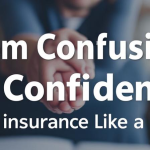Starting a new business is an exciting, yet often overwhelming, venture. As an entrepreneur, you’re likely focused on bringing your product or service to market, building a customer base, and navigating the daily challenges of running a business. However, amid all these tasks, one of the most important steps that many startups overlook is securing the right business insurance.
Business insurance serves as a safety net for your company, protecting you from financial risks associated with accidents, lawsuits, property damage, and more. Whether you’re operating as a sole proprietor, in a partnership, or as a small corporation, understanding and securing the right insurance coverage is essential to safeguarding your business’s future.
In this article, we’ll explore the basics of business insurance, outline key coverage options for entrepreneurs, and help you understand why securing the right insurance is one of the most critical investments for your startup.
Why Entrepreneurs Need Business Insurance
When starting a business, many entrepreneurs view insurance as an unnecessary expense, especially when cash flow can be tight. However, the truth is that business insurance provides essential protection from unpredictable risks that could potentially bankrupt your startup.
Imagine your business is hit by a lawsuit, an employee gets injured on the job, or a natural disaster damages your office or inventory. Without insurance, these events could lead to devastating financial consequences that might derail your entrepreneurial dreams.
On the other hand, business insurance helps minimize these risks by providing financial protection against accidents, lawsuits, damage, and other unforeseen circumstances. It not only helps protect your business assets but also offers peace of mind, allowing you to focus on growing your company.
Types of Business Insurance Every Entrepreneur Should Consider
There are various types of business insurance policies available, and the right coverage for your business will depend on factors like the nature of your business, your industry, and the size of your operations. However, there are several key types of insurance that every entrepreneur should consider when starting out.
1. General Liability Insurance
General liability insurance is one of the most basic and essential types of business insurance. It protects your business from third-party claims related to bodily injury, property damage, and personal or advertising injury.
For example, if a customer slips and falls while visiting your office or store, general liability insurance can help cover their medical expenses and any legal fees if they file a lawsuit. This coverage is important for protecting your business from a wide range of risks that could arise from normal business activities.
Even if you run a home-based business, accidents can happen, and general liability insurance provides a critical layer of protection. This type of insurance is also often required by landlords or clients who want to do business with you, making it an essential first step for many entrepreneurs.
2. Property Insurance
If your business owns or rents physical space, property insurance is crucial. This type of insurance covers damage to your business’s physical assets, including the building, equipment, inventory, and other business property.
For example, if a fire breaks out and damages your inventory or office furniture, property insurance can help cover the costs of repairs or replacements. If your business relies on specialized equipment or expensive technology, property insurance ensures you won’t face financial ruin if something goes wrong.
Even if your business is based out of your home, property insurance can help protect essential equipment and inventory. In some cases, this may be bundled with general liability coverage, or it can be purchased separately.
3. Workers’ Compensation Insurance
If you have employees, workers’ compensation insurance is a must-have. This type of insurance covers medical costs, rehabilitation expenses, and lost wages if an employee is injured or becomes ill due to their job.
For instance, if an employee is hurt on the job and needs medical treatment or time off to recover, workers’ compensation insurance ensures they receive the help they need without the financial burden falling on your business.
In many states, workers’ compensation insurance is legally required for businesses with employees. Even if it isn’t required by law in your jurisdiction, providing workers’ compensation insurance demonstrates that you care about the well-being of your staff, and it can help you avoid expensive legal battles if an accident occurs.
4. Professional Liability Insurance
Professional liability insurance, also known as errors and omissions (E&O) insurance, is especially important for businesses that provide services or professional advice. This insurance protects your company against claims of negligence, mistakes, or omissions in the services you provide.
For example, if you run a consulting business and a client alleges that your advice led to their financial loss, professional liability insurance can help cover legal costs and any damages awarded by the court.
Professional liability insurance is particularly important for entrepreneurs in industries such as accounting, law, real estate, and consulting. Even if you have years of experience, mistakes can happen, and professional liability insurance ensures your business is protected in case of a dispute.
5. Commercial Auto Insurance
If your business uses vehicles for operations—whether it’s for deliveries, transporting employees, or visiting clients—commercial auto insurance is essential. Personal auto insurance typically doesn’t cover vehicles used for business purposes, which means that if your company car is involved in an accident, your personal auto policy might not provide the necessary coverage.
Commercial auto insurance protects your business vehicles, covering expenses related to accidents, theft, vandalism, or damage. It can also extend coverage for liability if an employee is driving the company car when an accident occurs.
If you only use your personal vehicle for occasional business tasks, it’s still worth considering commercial auto insurance, especially if you frequently drive for work.
6. Cyber Liability Insurance
In today’s increasingly digital world, cyberattacks and data breaches are a growing concern for businesses of all sizes. If your business stores sensitive information such as customer data, credit card details, or intellectual property, cyber liability insurance can protect you from the financial fallout of a data breach or cyberattack.
Cyber liability insurance helps cover costs related to data recovery, customer notification, legal fees, and potential damages if your business’s cybersecurity is compromised. With the rising threat of cybercrime, this type of insurance is becoming a must-have for entrepreneurs, especially those with an online presence or a reliance on digital systems.
7. Business Interruption Insurance
Business interruption insurance provides coverage if your business operations are temporarily halted due to a covered event, such as a fire, natural disaster, or theft. This type of insurance helps replace lost income and pay for ongoing expenses while your business is being repaired or restored.
For example, if a fire destroys your office, business interruption insurance can help you cover rent, utilities, and payroll while you rebuild. This coverage can be especially important for businesses with physical locations or those that rely on regular customer traffic.
How to Determine What Coverage Your Business Needs
Every business is unique, and the type of insurance you need will depend on the nature of your operations, industry risks, and the number of employees you have. Here are some steps to help you determine the right coverage:
- Evaluate Your Risks: Consider the specific risks your business faces. If you provide a service, you may need professional liability insurance. If you have employees, workers’ compensation insurance is likely necessary.
- Check Legal Requirements: Research your local laws to determine whether certain types of insurance are required. Workers’ compensation and commercial auto insurance may be mandatory, depending on your location.
- Consult an Insurance Broker: Insurance brokers can help you assess your business’s needs and recommend the right policies for your startup. They can also help you navigate complex coverage options.
Conclusion
Business insurance is a crucial investment for any entrepreneur just starting out. While it may seem like an additional cost, it’s an essential safeguard against potential risks and disasters that could threaten the future of your business. By understanding the key types of coverage available, including general liability, property insurance, workers’ compensation, and professional liability, you can ensure that your business is adequately protected.
As you plan your startup, take the time to consult with an insurance expert, evaluate your risks, and secure the necessary coverage to safeguard your business’s future. By doing so, you’ll be able to focus on growing your company and achieving your entrepreneurial goals with confidence.






Leave a Reply